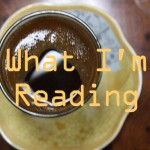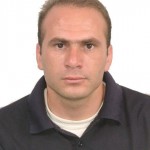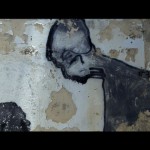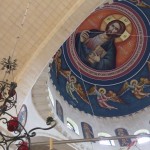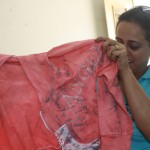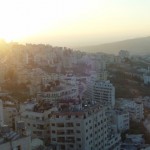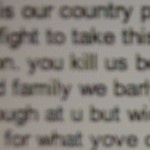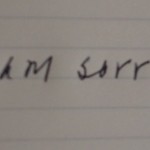
From my apartment in Nablus, West Bank, the Call to Prayer echoes through the city as I read about a wave of Islamophobia in the U.S.
I walk out of my apartment complex, ready to go to a meeting. Â A taxi driver honks as he passes me to see if I need a lift. Â I nod and he stops. Â “Balad?” I ask. Â He nods to say he’s headed downtown. Â He asks where I’m from. Â “Amrika,” I respond. Â “Ahlan wa sahlan,” he says, welcoming me to Nablus. Â Sometimes, if the driver speaks more English, he’ll ask if I like it here, “You like Nablus?” Â I always respond with an enthusiastic yes. Â I love Nablus.
I am embarrassed by the fear and hate aimed at Muslims while I am here, being hosted and heartily welcomed by my Muslim neighbors.
As Nicholas Kristof said in his September 18th Op-Ed, we owe Muslims an apology.
At home in Chicago, one of my friends graciously invited me to many of the feasts and celebrations she attended with her fellow Muslims. Â I would typically be the only non-Muslim in the room. Â We’d welcome each other with, “As-Salamu Alaykum” and eat together. Â I would come home with henna decorating my hands and an invitation to the next feast. Â One time, a woman recognized me from an event a few weeks before. Â “What, do you just like hanging out with Muslims or something?” she asked, incredulously. Â My answer was simply, “Yes.” Â She laughed. Â I walked out the door with a plate of leftovers.
To those Muslims who welcomed me into their homes in Chicago, and to my friend who so enthusiastically toted me with her, I apologize.
At home in Chicago, I once attended bible study with my friend’s young adult group. Â The discussion was about Christian values. Â More specifically, that Christian values are more ethical than others. Â That they are better. Â I thought about those I love who are not Christian, who teach me on a daily basis how to be a better person because of their personal values and ethics. Â I disagreed vocally. Â The youth pastor responded by quoting a book he read and telling me that a Muslim he knows agrees with him.
To those Muslims who are treated as though their values are inferior, I apologize.
Once, a taxi driver pulled up to the place where he was dropping me off and, before I got out, said, “I like the American people, but I do not like the policies of the American government. Â Go home. Â Tell them what you see.”
To my Muslim friends and neighbors in Palestine, I apologize for the acts of hate and the words expressed in ignorance of your faith. Â The slurs against Muslims that you hear in mass media coming from America, do not represent the beliefs of all Americans. Â They do not represent my beliefs.
I shared Kristof’s article, “Is This America?” on my facebook page and I made this comment along with it, “I am embarrassed to hear about acts of intolerance and hate against Muslims while being welcomed and hosted by my Palestinian friends and neighbors who are Muslim. This cannot be America.”
Nearly immediately one of my Nablusi friends replied, “We are all alone against the whole universe :(.”
Others quickly replied with words of encouragement for my Nablusi friend. Â One of my Facebook friends sent me a message urging me to remember the tolerance in America, and saying that this anti-Islam sentiment is exaggerated by the media.
Undoubtedly the media is making the most of this debate. Â Just like my Facebook friend said, mass media is not jumping to tell the heartwarming stories about people getting along and learning from each other. Â But, in the end, I’m glad I know about the pastor who said he would burn the Koran, because only then do we have the opportunity to verbally revolt against his ignorance.
And I am proud of those who practice tolerance and acceptance in America.
Every Friday night in Chicago, for example, Cafe Pride is hopping. Â Cafe Pride welcomes homeless, LGBTQ kids, many of whom are racial minorities, into Lakeview Presbyterian Church for an evening of music, movies, snacks, games, socializing and most importantly, acceptance. Â These kids are often outcast from their own home for their sexual identity. Â But they are welcome in this church.
Americans should not forget that there are amazing places, like Cafe Pride, that celebrate diversity and exemplify acceptance.
But, in celebrating that there is acceptance, we must not forget to challenge ignorance. Â The two go hand-in-hand.
We cannot miss the opportunity to express dissent against racism, intolerance and ignorance. Â I want to look back at this time, September 2010, and be able to say that I spoke up against intolerance against Muslims in America. Â I didn’t simply consider all the great things America is doing, I spoke up to encourage us to do even more great things.
The America I know and love, is one that celebrates each other’s differences. Â This place filled with Islamophobia, that I hear about everyday in the news, cannot be America. Â We can do better.
Please read the article below.  You can read the original article at the Palestine Chronicle.
Regarding US Muslims: A Misguided Debate
By Ramzy Baroud
Laurie Goodstein’s article, ‘American Muslims Ask, Will We Ever Belong?’ was intended as a sympathetic reading of the concerns of US Muslim communities facing increasing levels of hostility and fear. While generally insightful and sensibly written, the article also highlights the very misconceptions that riddle the bizarre debate pitting American Muslims against much of the government, the mainstream media and most of the general public.
This is how Goodstein lays the ground for her discussion: “For nine years after the attacks of Sept. 11, many American Muslims made concerted efforts to build relationships with non-Muslims, to make it clear they abhor terrorism, to educate people about Islam and to participate in interfaith service projects. They took satisfaction in the observations by many scholars that Muslims in America were more successful and assimilated than Muslims in Europe.†(New York Times, September 5, 2010)
This argument is not Goodstein’s alone, but one repeated by many in the media, the general public, and even among American Muslims themselves. The insinuation of the above context is misleading, and the timeline is selective.
True, it largely depends on who you ask, but there seem is more than one timeline in this narrative. The mainstream interpretation envisages the conflict as beginning with the hideous bombings on September 11, 2001. All that has happened since becomes justified with the claim that ‘Muslims’ started it. These same ‘Muslims’, some argue, are now twisting the knife by wanting to build a mosque not too far from Ground Zero, and they must be stopped. The media fan the flames of this fear, while unknown, attention-hungry zealots propose to burn the holy book of Islam. Scheming rightwing politicians jump on board, fiery media commentators go wild with speculations, and the public grow increasingly terrified of what the Muslims might do. Even the sensible among all of these groups advise Muslims to basically try to make themselves more likable, to assimilate and fit in better.
That timeline and logic may be omnipresent in mainstream society in the US, but many on the fringes dare to challenge it. More, throughout Muslim-majority countries, in fact most of the world, September 11, 2001 was one station, however bloody, among many equally bloody episodes that defined the relationship between Muslims and the United States. Again, it all depends on who you ask. An Iraqi might locate the origin of hostilities with the Iraq war of 1990-91, and the deadly sanctions that followed, taking millions of civilian lives over the next decade. Some Muslims might cite the US military presence in holy Muslim lands, or their intervention in Muslim countries’ affairs. They may also point to the US government’s support of vile and brutal regimes around the world.
But the vast majority, while acknowledging all of these, will refer to the genesis of all hostilities – before Saddam Hussein existed on the map of Arab politics, and before Osama bin Laden led Arab fighters in Afghanistan, with the direct support of the US, to defeat the Soviets. It is the tragedy in Palestine that has continued to pain Muslims everywhere, regardless of their background, politics or geographic location. They know that without US help, Israel would have no other option but to extend its hand to whatever peace offer enjoys international consensus. With every Palestinian killed, an American flag is burned, since the relationship has been delineated with immense clarity for decades. When US General David Petraeus argued last March that the Israeli-Palestinian conflict was fomenting anti-American sentiment, he spoke as a military man stating a fact. He was right, although many continue to ignore his remarks at their own peril.
True, timelines can be selective, but empathy requires one to understand another’s perspective and not just one’s own.
The Florida Priest on a mission to burn the Koran needs to see past his own terrible prejudices. Media commentators need to stop pigeonholing Muslims, and realize that there is no such thing as a Muslim polity in America. There is no truth to the idea that all Muslims hold the same religious values and political aspirations which are at constant odds with ‘American values’, and which need to be amended in order to make peace with their ‘new’ surroundings.
Needless to say, talks of ‘assimilation’ are misguided. Muslims have lived in the United States for generations and have become an essential part of American life. Millions of US Muslims are also African American. Do they too need to assimilate? And if not, should we divide American Muslims to groups based on ethnic background, skin color, or some other criterion?
One cannot offer simple recipes by calling on the general public to adopt this belief or ditch another. Public opinion is formulated through a complex process in which the media is a major player. However, it is essential that one remembers that history is much more encompassing and cannot be hostage to our diktats and priorities. Such selective understanding will surely result in a limited understanding of the world and its shared future, and thus a misguided course of action.
That said, Muslims must not fall into the trap of victimhood, and start dividing the world into good and evil, the West and Muslims, and so on. How could one make such generalized claims and still remain critical of the notion of a ‘clash of civilizations’? It remains that many Americans who have a negative perception of Muslims are not motivated by ideological convictions or religious zealotry. Most American clergy are not Koran-burning hateful priests, and not all media pundits are Bill O’Reilly.
There is no question that the conflict remains largely political. Misconceptions and misperceptions, manipulated by ill-intentioned politicians, media cohorts and substantiated by violence and war will not be resolved overnight. However, hundreds of interfaith dialogues and conferences will not change much as long as American armies continue to roam Muslim countries, support Israel and back corrupt leaders. Reducing the issue by signaling out a Muslim community in this country and then calling on frightened and fragmented communities to ‘make more effort’ is unfair and simply futile.
– Ramzy Baroud (www.ramzybaroud.net) is an internationally-syndicated columnist and the editor of PalestineChronicle.com. His latest book is My Father Was a Freedom Fighter: Gaza’s Untold Story (Pluto Press, London), now available on Amazon.com.
